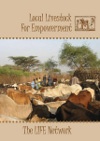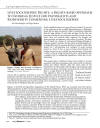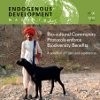Local livestock for empowerment: The LIFE Network
Imagine if all cows were black and white… if all the pigs were pink… if every sheep, and every chicken, were white…
This booklet draws attention to the threat to local livestock breeds, and describes what the Local Livestock for Empowerment (LIFE) Network is doing to help pastoralists and small-scale livestock keepers to maintain them.

Download document


